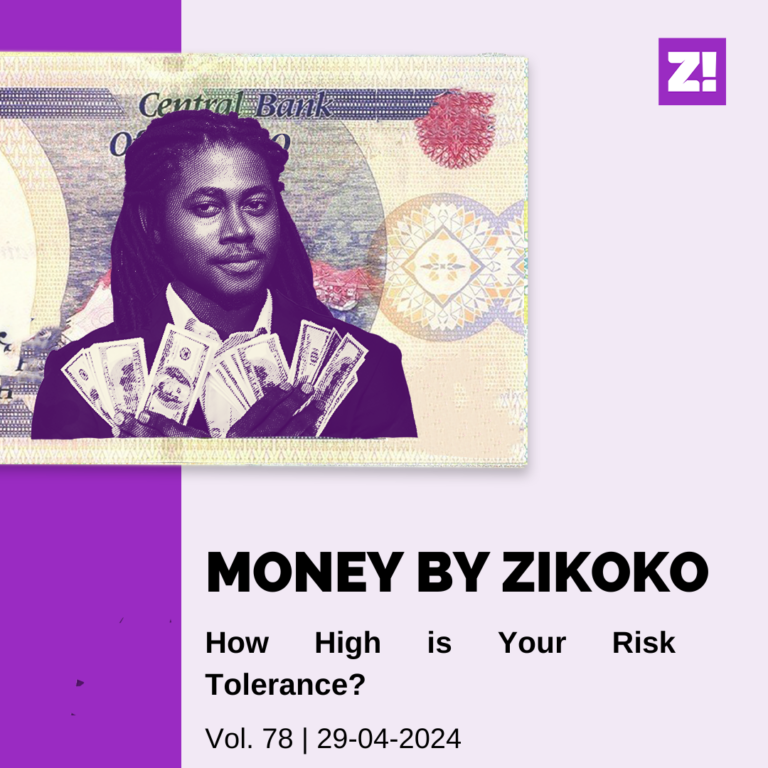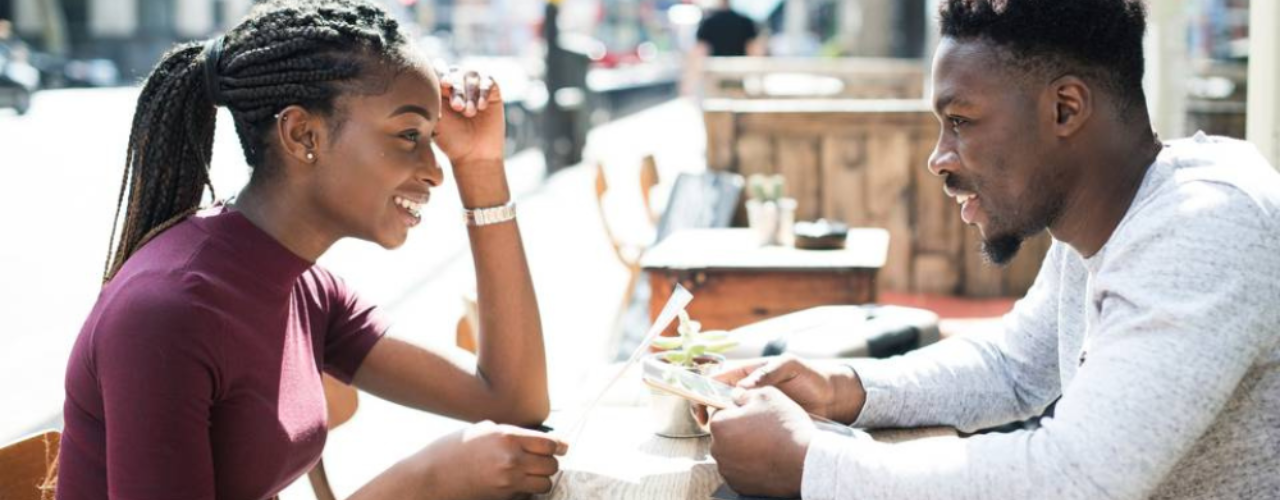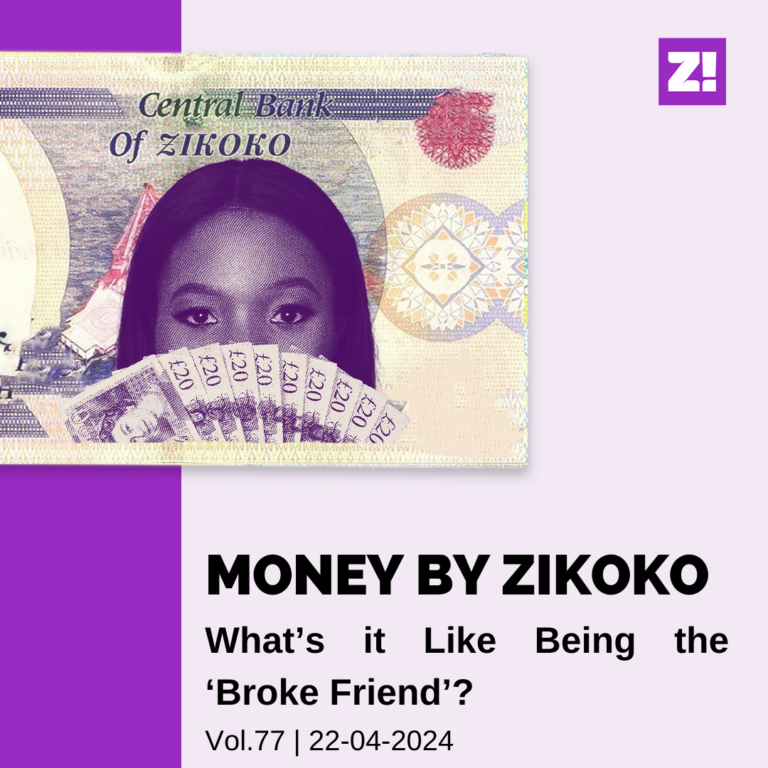Every week, Zikoko seeks to understand how people move the Naira in and out of their lives. Some stories will be struggle-ish, others will be bougie. All the time, it’ll be revealing.
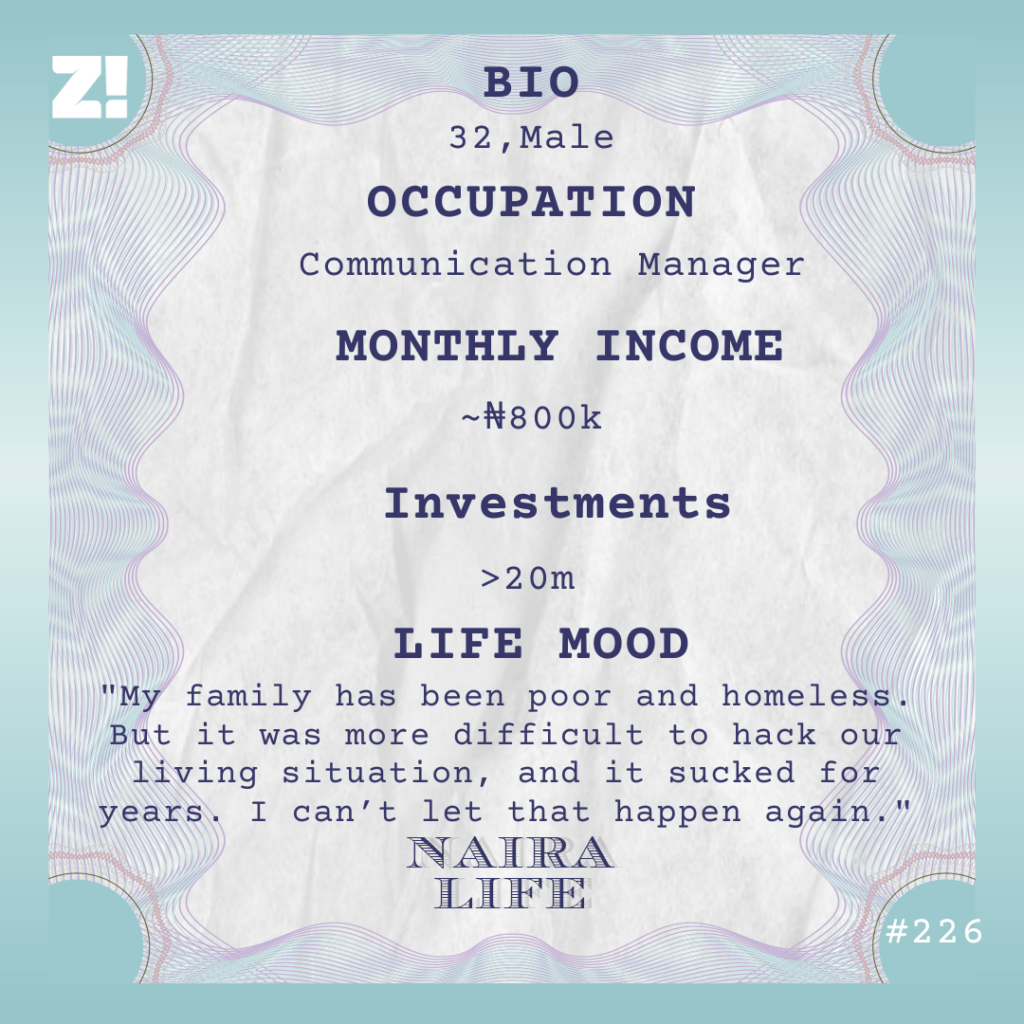
When was the first time you knew what money meant?
In 2001, I was a JSS 2 boarding student, and it was two weeks to a new term. Unfortunately, my parents hadn’t raised money for my school fees and other needs like a new uniform and provisions. My mum was overwhelmed and stressed, so I asked her to give me some of the stuff in her shop to hawk and make some money.
What was in your mum’s shop?
She was a tailor, so she had a small stock of tailoring materials she sold on the side. She didn’t think these would sell very fast, but she had another idea.
The following day, she took me to one of her friends who sold consumer goods in bulk and convinced her to give me some of her stock. By the end of the day, I had a small set of toothbrushes, toothpaste, cotton wool and cotton buds to sell. For the next two weeks, I was at an interstate car park five days a week. When I finished selling a batch, I’d return to the cost price and profit to the woman and keep the markup I’d set.
What were the numbers like?
It was a fast-moving business. A roll of sachet toothpaste was ₦250, and my profit was ₦70/roll. A pack of toothbrushes was ₦200, and I made ₦100 on this. For the cotton wools, I was making about ₦50/pack. My average profit every day was about ₦500 – ₦600.
When I was returning to school, I’d earned enough money to get a new uniform and sandals. An uncle paid my school fees.
Fascinating. You started making money early
I had to. My dad was a factory worker with little income. The whole family lived in a tiny boy’s quarter, and everything we owned was lumped in a corner of the room we lived in. At the time, I had three siblings. The birth of my youngest sibling was another significant moment, and it drilled into me that I had no choice but to make money.
I’m listening
During a holiday when I was in SS two, I returned home to meet a baby — my youngest brother. I was like, “Wait, I don’t understand. We’re going through it and you guys are still making kids?” As my mum handed my brother to me, I burst into tears. It was the first time the reality of being the first child hit me. I was thinking, “Man. It’s going to be your job to be responsible for everyone.”
Damn. That’s heavy
Every time I was home for the holidays, I was always hawking something to make money — from pure water to soft drinks. But when I finished secondary school in 2006 and didn’t get into the university immediately, I decided to try my hands at something else.
What was that?
Selling recharge cards. My capital was ₦10k, which I got from an uncle and my mum. Luckily, I got a free spot at a car park and bought an umbrella and a chair for ₦3k. The rest went into packs of recharge cards, and I was in business. I was making a profit of ₦40 – ₦60 on a pack of recharge cards, depending on the network. And my profit every day ran into about ₦1k.
I was at the park from April 2008 to December 2009 when I got into the university. Subsequently, I handed the business to my younger brother.
How did uni go?
My uni was in the same city we lived in, so I’d help my brother out with the business during weekends and during semester breaks. That’s how I got money to survive.
This was my routine until 2013 when my brother had to go to university in another state, effectively ending the business. The timing was terrible because I had just gotten into my final year.
Luckily, a lecturer paid my school fees. But I still had to figure out how to survive the rest of the year since nothing was coming from home.
A friend suggested that I could try writing projects for students in my school, and I took it up. Unfortunately, the school went on strike at some point, so that source dried up. Subsequently, I did a bunch of stuff: I worked as a lesson teacher, earning ₦350/day. Then I worked with a horticulturist and got paid ₦1k/day when there was work to do. After that, a relative linked me up with a marketing job that paid me ₦1500/day.
When the strike got suspended and the school went back into session, I returned to writing projects and did that until I graduated in 2014. I also managed to save about ₦50k, which I used to sort out some basic expenses when I was going for service.
What about NYSC?
I lived on the ₦19800 allowance from the government for the first few months before I got another business idea. There weren’t a lot of people selling men’s shirts, so I thought I could fill that gap. Using my allawee as capital, I travelled to a neighbouring city and bought some shirts. Each one cost ₦900, but I sold them for ₦2k.
You should read this too: The #NairaLife Of A Lawyer Who Is Obsessed With Investment Opportunities
Lit
I had close to about ₦70k saved up when I finished NYSC. But the major highlight was getting a job in the same month after NYSC ended. That was a big deal for me. I moved to Lagos to live with an uncle and start the job. This was in July 2015.
What was the job about?
I was hired as a relationship officer at a stock-broking firm. My job was to sell the company’s product to clients. My salary was ₦66k, but after removing feeding and transportation expenses, I usually had about ₦10k left. That barely covered anything.
Luckily, a customer service opportunity opened up in my uncle’s place of work in 2016, and I took it. The pay was ₦50k.
Wasn’t that a pay cut?
I took it because of the additional perks. There were bonuses, which brought my monthly income to about ₦80k. Also, there was free transportation for all staff members. It was a better deal than my previous job. I worked there from 2016 to 2018.
How did you move money during that time?
My core saving was ₦10k/month. But on the side, I was also in a five-people contribution scheme, in which I put ₦20k every month.
Whenever it was my turn to get the money, I’d send everything home — my parents had started building a house, and I wanted to finish the project. Also, my siblings were already in university, so there was always a need for money at home.
What happened after?
In 2017, my cousin introduced me to Twitter. His pitch was that I could make money from the platform if I built my account and became an influencer. So I decided to give it a try.
For the next few months, I read a ton about building a social following. Then I started tweeting about funny things, and some of them went viral.
Interestingly, my follower count started growing, and little gigs followed. Someone would reach out and ask me to retweet something, and I’d get paid between ₦2k and ₦5k. But those were far an in-between.
The most interesting thing was that Twitter got me my next job.
How?
In 2018, I saw a customer service opening at an energy company and decided to apply for it. They got back to me, inviting me to an interview. During the interview, one of the guys on the panel recognised me from Twitter, and I still believe that this played a small part in their decision-making process. I was invited for a few more interviews, and I got the job.
The role was a customer service rep, but I was also working on the social media team. My salary was ₦130k.
I’ve been at the company since that time.
How has your role evolved over the years?
I spent about two years in customer service and social media before I was transferred to the corporate communications department in 2020. I’ve also gotten a few raises in the past few years.
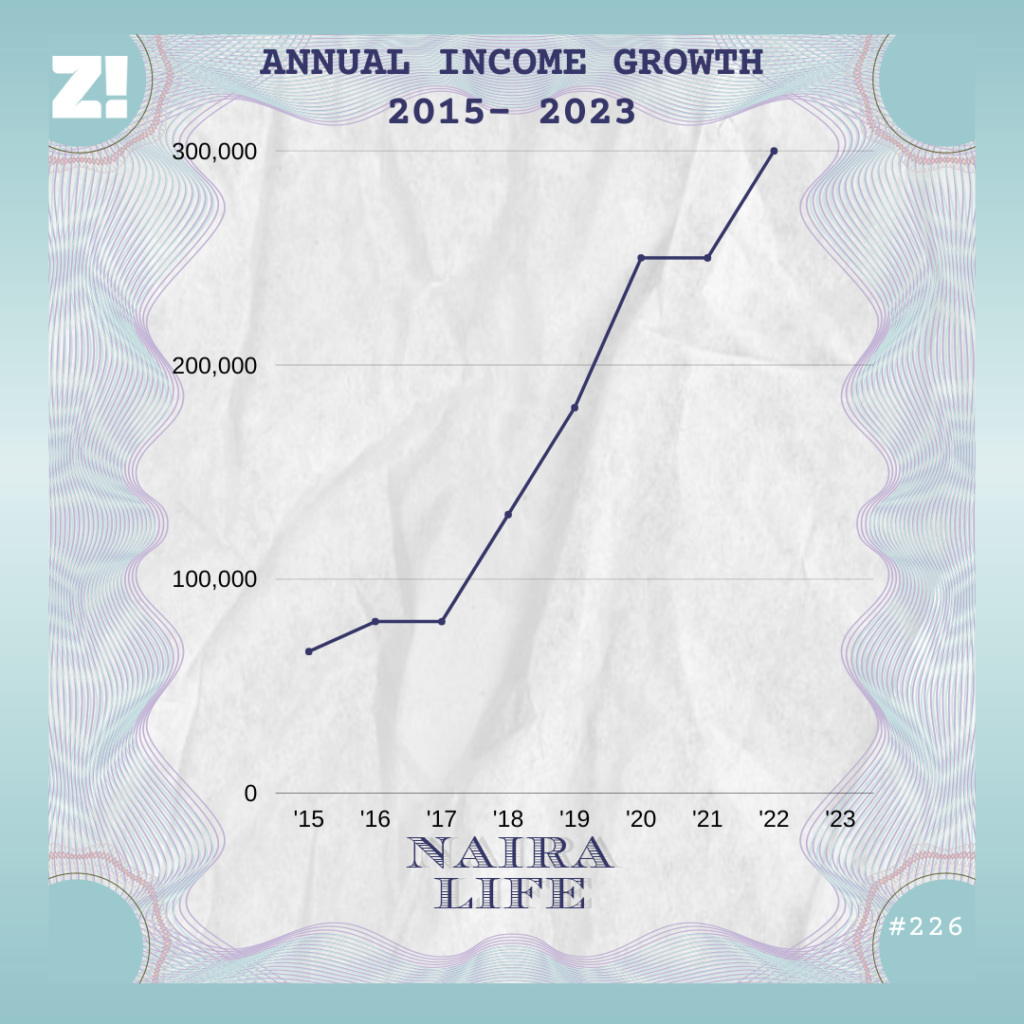
What else has happened in that time?
My job opened my eyes to how best I can leverage my Twitter following. In the past five years, I’ve also been consulting for brands. As my following grew, so did my charges. It’s pretty much my side hustle now, and I make between ₦300k and ₦500k from my Twitter account every month.
Sweet. Your monthly income is about ₦800k
See, I don’t even like to think about it because it scares me. It’s always like this thing can vanish at any time. It’s also why I don’t keep money in my account anymore.
Wait, you don’t save?
I don’t save money. To be honest, I’m not sure I have up to ₦30k in my account at the moment. It’s almost like a phobia now.
Once I have a lumpsum amount, I immediately invest it in something, usually real estate.
Why?
We had trouble with accommodation when I was growing up, and nobody deserves to go through that. At some point, we were living inside a compound used for trade fairs and were at the mercy of the government because they could kick us out at any time.
This is why one of my priorities in the past few years was completing my parents’ house, and I did that about two years ago. Now, I’m putting as much as I can into my real estate investments, and I have some properties in two states in the southwest.
Can you tell me more about these investments?
I made my first real estate investment in 2021 — one acre of land somewhere in Ogun state, and it cost about ₦1.6m. I’m currently developing it, and I’ve spent about ₦10m on the project. The property is valued at about ₦20m now, although I have no intention of selling it.
There’s another acre of land in Oyo state, and I bought it for ₦2m. The last one — also an acre of land — is also in the Oyo state, and it cost me ₦900k.
Interesting. What’s your plan for these investments?
The plan is to develop these into buildings and invest in more properties. The thought of having them calms me in a way money in my account doesn’t. My family has been poor and homeless, but I always figured out how to make some money, as little as it might have been. It was more difficult to hack our living situation, and it sucked for years. I can’t let that happen again.
That’s fair. A segue, what do your monthly running costs look like?
Investments — ₦250k
Internet — ₦20k
Feeding — ₦90k
Parents’ allowance — ₦50k
Siblings’ allowance — ₦50k
Scholarships — ₦50k
Flex money — ₦50k
I have a few cousins and nephews living with me, which is why my feeding budget is that high. Also, I’m sending two kids to school, and I budget ₦50k for their monthly expenses.
How much do you think you should be earning now?
₦1.5m/month seems like a good number at the moment. But if I want to achieve everything I want to do in the next five years, ₦5m/month should be what I should be aiming for.
Interesting. What would you like to do in the next five years?
I want to go for my MBA and be CIM certified. Also, I’d like to grow a clothing and branding company I started in 2018. I already have the contacts and networks — I just need money to start. Of course, I’d like to buy more properties, too. It’s a lot. Haha.
Recommended: How Could This Tech Bro Afford A Year Break From Work? Equity And Stocks
Back to the present, what do you want right now but can’t afford?
A property in Banana Island. A plot of land there, as far as I know, is about ₦1b. But man, if I have the means to do that, I won’t hesitate for one second. It’s the dream.
That’s on-brand. What’s the last thing you brought that improved the quality of your life?
My car. I bought it in 2022 for ₦3.8m. Now someone uses my old car for Uber, and this brings in some monthly passive income for me.
On a scale of 1-10, how would you rate your financial happiness?
6. I live a very comfortable life, and I’m in a much better place than I was about a decade ago. I won’t trade it for anything. That said, there are still a lot of things I’d like to do but can’t yet.
If you’re interested in talking about your Naira Life story, this is a good place to start.
Find all the past Naira Life stories here.

